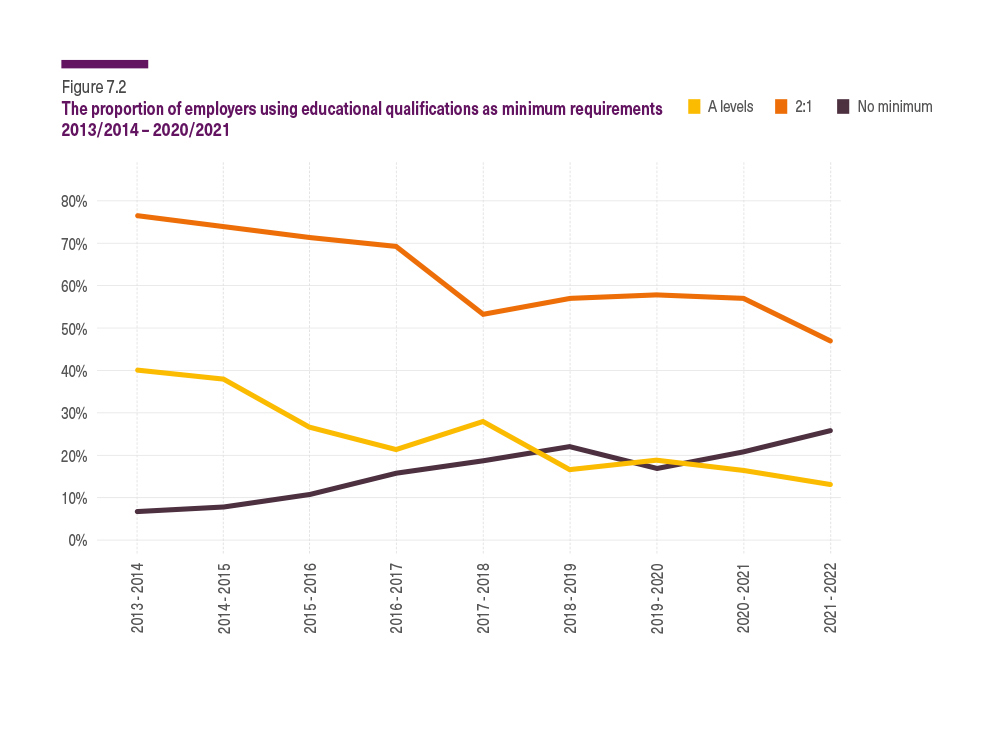ISE’s Student Recruitment survey reveals how employers assess and select candidates is shifting.
Chapter seven of our student recruitment survey provides insight to how companies are selecting candidates to employ. Here are two of the biggest trends.
Less than half of graduate employers stipulate 2:1 degree for first time
This year we found that the number of employers stipulating a 2:1 degree as minimum entry criteria for graduate jobs has fallen to 48%.
While a 2:1 degree remains the most common requirement for graduate roles, this is the first time in the history of our survey that the number has dropped to less than half. The number is down from 57% in 2021.
Earlier this year ISE member PwC announced that it is removing 2:1 criteria for undergraduate and graduate roles to ensure that it doesn’t miss out on talent.

ISE also found that a fifth of companies stipulate at least a 2:2 degree while just 13% set a UCAS point minimum.
Employers are less concerned about the subject studied than students think and even fewer look for a masters qualification. A fifth of employers expect applicants to have a specific subject degree and only 6% require a postgraduate degree.
The report revealed that three quarters of graduate employers set some minimum requirements that a candidate must have to be able to apply for a role. However, since 2013 there has been an upward trend in companies requiring ‘no minimum requirements’. The number of employers endorsing this practice has increased by 5% in the last year to 26%.
More than a third of employers reported that they have future plans to shift to qualification blind recruitment.
Read the story on qualifications in ISE news and analysis in The Times.
Personality tests lose favour
We asked members about selection methodologies and activities. Interestingly, we noticed that personality tests are reducing in frequency.
In 2014, 32% of employers reported that they use personality tests and this dropped to 9% in 2022.
This may be a good thing as questions have been asked about the impact that such tests have on diversity. For example, a report by the Center for Democracy and Technology details how using personality tests in recruitment can harm and exclude candidates with disabilities.
We asked also respondents what sort of assessment philosophies underpinned their chosen methodologies and activities:
- 68% said a competency-based lens underpinned their recruitment strategies. This asks candidates to show how they would demonstrate certain behaviours and skills in the workplace.
- 56% take a strengths-based perspective. Rather than focusing purely on candidates’ skills and behaviours, strength-based recruitment focuses on the intrinsic motivation that drives those behaviours.
- 35% of employers use a values-based exercise within their recruitment process. This type of activity seeks to help candidates identify their values and find roles in line with their values.
- 38% of employers take a technical-based assessment philosophy throughout their recruitment approach, assessing and valuing technical skills required for a role.
The survey also found that respondents use a wide range of selection activities, but the most effective at first stage were psychometric assessments (43%), applications forms (41%) and CVs (25%). Whereas, the most effective at final stage were assessment centres (74%), interviews (66%), and group tasks (16%).
Respondents also provided further information around which types of psychometric tests they use. Similar to last year’s report, situational judgement tests (23%), numerical reasoning (21%) and critical or logical reasoning (16%) are the most popular types of test.
Read more insight and data on assessment and selection


0 Comments
Trackbacks/Pingbacks